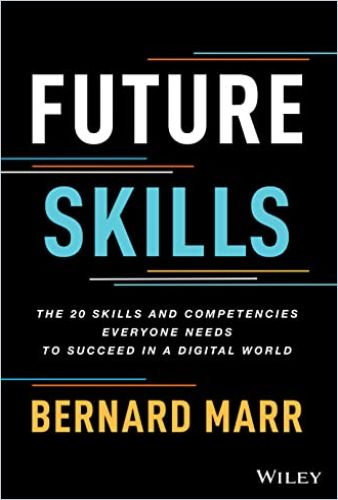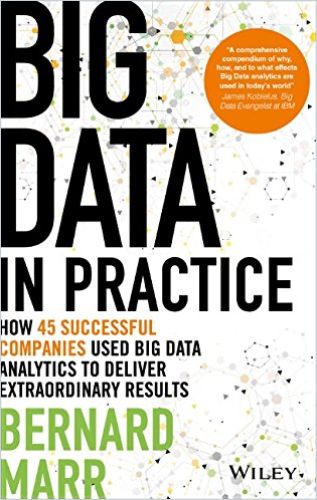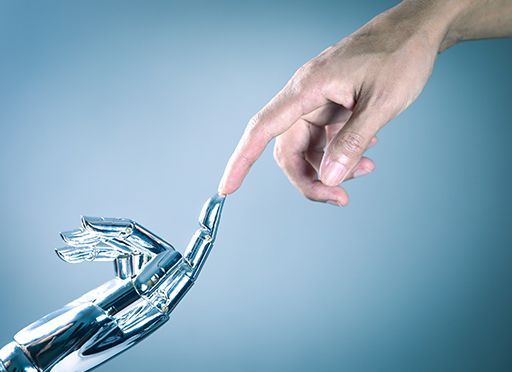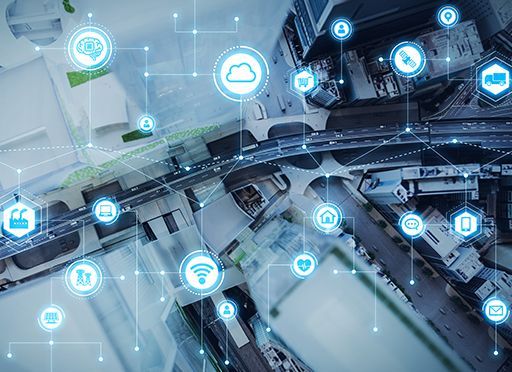“We Need to Have Continuous Learning Built Into Our Lives”

Futurist Bernard Marr is the author of Future Skills: The 20 Skills and Competencies Everyone Needs to Succeed in a Digital World. He’s an expert in today’s extreme technological changes and the things workers must do to keep their skills honed. Yes, technical skills are important, but what makes humans valuable is the interpersonal skill they bring to their jobs.
Bernard, it seems the future of work is right at our doorstep. In Future Skills, you set the scene for the massive technological change we’re living through. Can you describe some of these momentous changes?
We’ve never lived in a time of such fast technological transformation. We now have so many amazing technologies that individually are transformative, like artificial intelligence, like 5G, like the metaverse, like gene editing. These technologies are converging and making each other stronger and faster. This has real implications for what it means to be human in the future, what our jobs will look like and what our businesses will look like.

You make the case that today’s workers need to know their way around the Internet, Zoom meetings and basic productivity software, but what else constitutes the digital literacy that employers are looking for?
There are two different forms of digital literacy. The first is simply being comfortable with computers – using your phone, going on the internet – these things are basic skills everyone will need. The second kind is to understand, at least at a basic level, some of these technologies that we have: what AI (Artificial Intelligence) and machine learning are, what does the metaverse mean and what is blockchain technology? They will change our jobs and businesses and open up new opportunities for us.
How is data literacy different from digital literacy?
Data is the lifeblood of today’s organizations. Every organization now realizes data is important. We wouldn’t have AI without access to the vast amounts of data we have, and we now use data to better understand our customers. We use data to automate and personalize our products and services, and this helps us make better-informed decisions. So, we need to understand that data is important, we need to protect our own data, but also have the basic skills to use this data and turn it into insight. So, if you work in marketing or HR and realize the importance of data, your company has a business intelligence platform that allows you to pull data together and analyze it. It’s important that we’re able to do this and become more comfortable with it.
Take-Aways:
- The pace of change for business keeps accelerating as technologies such as artificial intelligence (AI), 5G and virtual reality converge.
- Employers will expect both basic digital literacy as well as data literacy – the ability to analyze data to glean insight.
- “Soft” interpersonal skills are even more important for workers to hone than technical skills, since machines can’t learn them.
So perhaps a human in the loop is even more important in the future than less important, with all the different data streams coming in. Is that right? Are humans becoming more important in getting that kind of business insight?
Not necessarily. There are two sides to this. On the one side, we need humans that are more comfortable extracting insights from data or understanding whether the data is complete or might be biased in a way. For that, we need humans in the loop. But, we’re also seeing machines become more automated and capable of pulling insights out of data by themselves. So, in the past, we simply relied on humans to ask a question and then dive into the data, analyze it and get an answer. Nowadays, we have intelligent AIs that can look at data, spot patterns and suggest “Oh, it looks like those customers are more likely to churn than others. You might want to look at this.”
The key word here is augmentation. All these technologies, all this data, will change how we work.
We don’t want to completely automate things that have high stakes associated with them. For example, in the military, we don’t want a drone to make its own decision whether to kill someone or not. In medicine, we don’t want a robot to autonomously decide to amputate someone’s leg. Maybe at some point in the future, we might, but not quite yet.
Can you illustrate this idea of job augmentation or enhancement?
A good example is how the radiologist’s job is changing. AI can interpret images of a CT scan more reliably than a human. AI doesn’t make mistakes. Humans are sometimes tired or upset, or they’re distracted. We don’t want to give it over completely to the AI, but they can work together. So, if you wanted to have a broken bone checked, the CT scans your body. A human being would only look at the crack because we have that bias to identify if this is broken or not. A human wouldn’t look at everything. AI can identify secondary diagnoses, saying it looks like your hip is slightly out of kilter. So, AI can do some of the more mundane things. Think about this: should the job of radiologists really be sitting and analyzing scans for 8 hours a day, or should it be thinking about a proper diagnosis, treatment plans, thinking about their interpersonal communication with the patient or how they might do more research? Lots of the jobs that machines will be able to do today or in the very near future are the things that maybe humans shouldn’t be doing because they’re almost wasting valuable human potential.
You certainly illustrated the best, most optimistic mindset for employees looking at AI: to look for the value they add to the job.
That is exactly the point. Hopefully, this will help us understand what truly makes us human, the value that we add and what gives us a competitive edge. Anyone can write an article summarizing a sports event but what makes it human is to really engage the audience, the creativity that comes with that.
You mentioned human biases, for instance, the radiologist just looking at the bone break instead of taking in the whole picture. How does one become aware of their own biases and what’s the best way to remove them from human assumptions and analysis?
Data can help with all of this. Becoming aware of your own biases can be difficult. You must develop the ability to critically assess how and why you’re making certain decisions, asking yourself, what am I basing this on? What do I presume is true? How do I weigh my options? To step back and ask, have I got any biases? And we all have biases. Sometimes using data can help us because if we have the right unbiased data, it challenges us. So we say, okay, this data suggests that this is the best person to employ. I thought that person was. How is the AI coming to this decision? How am I coming to this decision?
We’re already so used to using our smartphones, it stands to reason we’re soon going to get used to the enormous power at our fingertips with AI. It’s easy to forget algorithms can have biases too. So, do you take the same approach to analyzing them as analyzing yourself?
Whatever data we give the AI will inform how good the algorithm is. So, if I said I wanted to build an AI to predict the best candidate to become the next US president, and I only give it the data of all the previous US presidents, then it would never suggest a woman because the data is biased. Amazon fell into this problem. They trained an AI to identify people they wanted to recruit, but the data was biased toward males. We are building AIs that are more transparent. Lots of big tech companies are working on this. They will then help you understand what data has been used to make a certain prediction. That will help with this problem.
What are soft skills and why are they even more important now in an automated world?
Out of the 20 skills I talk about in Future Skills, 16 of them are soft skills. Hard skills are the skills we can codify. We can explain and transfer them to others. I can learn about accounting rules, write them down and give them to someone else, and they can read and understand them. I can give those to a machine that creates an algorithm to execute those skills. But soft skills are skills we develop over time. Often, we don’t know how we developed them. They come from experience and we can’t easily codify or transfer them. This means, at least currently, these are skills machines can’t do. They are the skills that make us uniquely human. People talking about the skills we need in the future often emphasize computer programming skills, math skills, data analysis skills and STEM skills. But actually, those are all skills machines are becoming extremely good at. We now have computer programs that can code for us. If we say give me computer code to do X and Y in Python, AI can do this. We humans need to focus on the skills that machines can’t do.
Can you highlight one or two soft skills?
Some of the most important skills are empathy, interpersonal and emotional intelligence and creativity – being able to imagine a better future. Machines can’t do that, and they can’t put it into practice. Human curiosity is really important. Critical thinking and complex decision-making, especially considering the wider context that machines can’t compete with us, are also important.
So, in terms of upskilling and staying agile, should workers just accept they will be continuously learning for the rest of their careers?
Yes. As a futurist, I have seen over the last ten years that the speed of change is continuously accelerating and that’s not going to stop. The half-life of skills, the time it takes for skills to become less valuable or useless is halving every two years or so. So, what we learned ten years ago is most likely out of date.
Probably the most important skill to have is the ability to learn throughout your entire life and to have a growth mindset.
A vital part of this is having curiosity. Learning now is easier than ever. In the past, we learn something in school, then we leave school and hope this knowledge takes us through to retirement. That world doesn’t exist anymore. If you’re a computer programmer, you maybe learned one language, but in your lifetime, you will have to learn three or four other languages. Online platforms make it easy for people to continuously learn things. It’s also easy to learn things for free. People follow me on YouTube and my blogs because I talk about all these technology skills and people want to stay up to date with them. When someone’s looking for a job, they should ask: is this employer giving me opportunities to develop? If I work in a job for three years where my employer doesn’t allow me to learn new skills or train and develop, then I’m literally falling behind.
You talk about teamwork and emphasize the ability to collaborate as a vital skill for future jobs. You also emphasize the soft skills involved: interacting respectfully with each other, with empathy and how those feed into and create a more creative culture, a more agile culture. But you also emphasize integrity. Why is integrity so important in the modern workplace?
Integrity comes down to being true to yourself and is closely related to ethics. In this big tech-driven world, ethics are increasingly important. The US Air Force recently employed an AI ethicist, and now lots of companies are looking into this because these tools are so powerful. If we think about some of the technologies I talk about – the ability of AI to enable self-driving cars, for example, there is a big ethical question as we program this machine’s algorithms. If the machine decides to avoid an object and potentially could crash into a pedestrian, how does the car make those decisions? We already have AIs that decide if prisoners can go on parole. We have immensely powerful technologies at our fingertips. With all of them come real ethical challenges. Lots of organizations create an ethics panel when they look at using some of these technologies. Ethics also applies to a programmer. If I’m programming an AI tool, it’s important to consider my own ethics and integrity to make sure we think about the consequences of these tools, all the potential misuses, biases and dangers they can bring.

In Big Data in Practice, you talk about the danger of becoming “data rich but insight poor,” which gets back to employee skills and critical thinking abilities.
We don’t start with the data; we start with a question. This is the most important skill humans can bring to the table. Start with the question and then think about what data you want to answer that question. Then you look at existing data. Lots of organizations do this the other way around, they look at what data they already have and then they try to extract insights from this data. That’s the wrong way around.
What are your thoughts about Web 3.0? It seems this emerging space is shaping up a little differently than Mark Zuckerberg, for instance, may have envisioned it; social platforms won’t necessarily dominate. What are your thoughts about where social media is going, where giant web platforms are going and how and where will advertisers market to their customers?
There’s so much hype and misunderstanding when it comes to the metaverse. For me, it is the future internet that is more immersive, more real, and even better. We are on a journey towards that. There won’t be a switch point when we say, okay, now Mark Zuckerberg has realized his vision that we all spend our time in VR meetings on Facebook Horizon. We’re already seeing what it will be. If you do a Google search for “unicorn,” something I recommend everyone do, you now have the option of viewing it in 3D on your phone. You click that button, scan your environment and then it will put the unicorn into your surroundings so you can have the unicorn in your kitchen. If you think about how much better it is, you now have an idea of scale. The unicorn is not only standing there, it’s moving around. This is so much better than a static picture.
This is already transforming entertainment. I recently went to see ABBA Voyage. This is a new ABBA concert in a purpose-built venue in London, but the ABBA members aren’t performing; it’s their avatars with live musicians. It was one of the best shows I’ve ever seen. And we’re seeing this transition in the gaming economy. If you think about how much time our teenagers spend on platforms like Fortnite and Roblox, these virtual worlds where they spend quite a lot of money kitting themselves out with new outfits, into new skins, this is a clear trend that’s only going to continue.
If you ask me where advertisers will advertise in the future? Wherever people are in a more immersive world.
For Mark Zuckerberg, it might be a little too early, but they’re putting lots of the building blocks in place. Will the current tech giants be the winners of the future? Nobody knows because there’s another component to this, which is a more decentralized world currently being built using things like blockchain technology. This is actually pushing us away from these centralized platforms controlled by one company and a few individuals to one governed by their users. That’s an interesting movement to watch.
Yes, I’m seeing the beginnings of social media with a more peer-to-peer type structure, but I have no idea how it could work in terms of creating larger interactive communities.
This is so new and emerging, I don’t doubt there are a few pilot projects going on with blockchain-based social media platforms. But it’s so early nobody can predict where this will all go. Some early adopters are setting up as decentralized autonomous organizations. There isn’t a board of directors that decides the direction the organization will take. I recently wrote about a wine subscription business that is a user community, and they decide what wines they will make in the future. It’s a self-governing platform, which is an interesting concept.
A last question: any off-the-shelf AI that you’d suggest people get familiar with to prepare themselves for an automated future job?
ChatGPT is a good platform that has been in the press a lot recently. It shows the power and potential of generative AI platforms. Another tool by OpenAI is Dall-e, a great platform illustrating how these tools can be creative. You simply type in a text description, and it will then create an image for you. You can have an image generated as a photograph. If you want a polar bear skateboarding through Times Square, it will give you that. Or you can say, I want a pencil drawing of a unicorn on Mars. Or a painting in the style of Van Gogh. It will do that for you. It’s interesting to see some of the potential and how fast these tools are evolving. And, very simple, Google Translate as an app on your phone, because this uses machine vision technology. So, when you go on holiday, simply point the camera on your phone to a menu that’s not in your language, and it will translate it for you. These kinds of things for me really illustrate how powerful and useful this technology already is.
About the Author
Renowned futurist Bernard Marr, author of Future Skills and Big Data in Practice, is a business and technology thought leader and consultant. Find him online on Twitter @BernardMarr or on YouTube.







